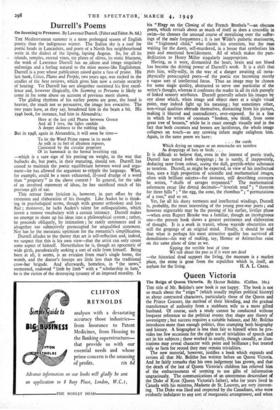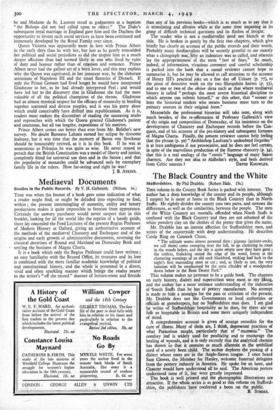Queen Victoria
The Reign of Queen Victoria. By Ikctor Bolitho. (Collins. 16s.) THE title of Mr. Bolitho's new book is not happy. The book is not so much about the " reign " (which usually implies political history) as about contrasted characters, particularly those of the Queen and the Prince Consort, the method of their blending, and the gradual transference of authority from a stubborn wife to a more gifted husband. Of course, such a study cannot be conducted without frequent reference to the political events that shape any theory of sovereignty ; but success requires a suitable balance, and Mr. Bolitho introduces more than enough politics, thus cramping both biography and history. A biographer is less than fair to himself when he pro- vides too few occasions for the right use of trivialities of speech and act in his subjects; worked in neatly, though casually, as illus- trations may reveal character with point and brilliance ; but treated only as facts for record they may remain trivialities. The new material, however, justifies a book which expands and revises all that Mr. Bolitho has written before on Queen Victoria. And he fairly remarks that his own judgement has grown, and that the death of the last of Queen Victoria's children has relieved him of the embarrassment of seeming to use gifts of information ungraciously. The communications of an anonymous descendant of
the Duke of Kent (Queen Victoria's father), who for years lived in Canada with his mistress, Madame de St. Laurent, are very interest- ing. The Duke was liked and respected by the Canadians, who were evidently indulgent to any sort of morganatic arrangement, and when he and Madame de St. Laurent stood as godparents at a baptism " the Bishops did not feel called upon to object." The Duke's subsequent royal marriage in England gave him and the Duchess the opportunity to invent such social services as have been continued and immensely developed by the Royal Family ever since.
Queen Victoria was apparently more in love with Prince Albert in the early days than he with her, but just as he gently remoulded her political and social prejudices so did she inspire him to a much deeper affection than had seemed likely in one who lived by rules of duty and honour rather than of emotion and romance. Prince Albert never had the gallant art of a born lover, and this may explain why the Queen was captivated, in her innocent way, by the elaborate attentions of Napoleon III and the tinsel flatteries of Disraeli. If only the Prince Consort had lived longer he would have interpreted Gladstone to her, as he had already interpreted Peel ' • and would have led her to the discovery that in Gladstone she had the most valuable of all the political champions of the throne. Gladstone had an almost mystical respect for the efficacy of monarchy in binding together scattered and diverse peoples, and it was his party alone which could conceivably have drifted into republicanism. As it is, readers must endure the discomfort of reading the unceasing snubs and reproaches with which the Queen greeted Gladstone's patient and courteous, but all too lengthy, expositions of his motives.
Prince Albert comes out better than ever from Mr. Bolitho's new survey. No doubt Baroness Lehzen earned her eclipse by tiresome jealousy, but it was time that the memory of Baron von Stockmar should be honourably revived, as it is in this book. If he was as sententious as Polonius he was quite as wise. He never ceased to preach that the British Constitution was a model of liberty and justice, completely fitted for universal use then and in the future ; and that the popularity of monarchy could be advanced only by exemplary family life in the rulers. How far-seeing and right he was! J. B. ArkiNs.







































 Previous page
Previous page